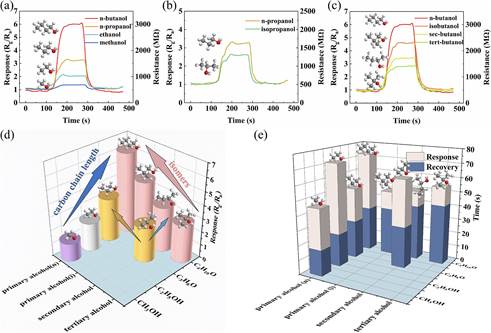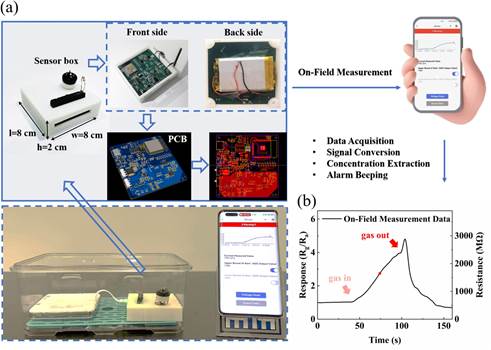A breakthrough study led by Associate Prof. Xu Fang from the College of Engineering Physics at Shenzhen Technology University (SZTU) has been published in the prestigious journal Chemical Engineering Journal (IF: 13.4). The study is titled “Alcohol selectivity of a room temperature-operated gas sensor based on TiO2 burr-like nanorods”. Undergraduate student Li Yan from the Class of 2025 and majoring in Applied Physics is the first author, and SZTU is the primary research institution. The research addresses critical challenges in gas sensing technology and showcases the innovative capabilities of SZTU students.

(a-c) The response and resistance curves of the TiO2-A450-66 h; (d) The response and (e) the response and recovery times of the TiO2-A450-66 h to all measured alcohols [Photo/https://www.sciencedirect.com/science/article/pii/S1385894725017449]
The study introduces a novel room temperature-operated alcohol sensor based on TiO2 burr-like nanorods. The sensor demonstrates fast response and recovery times, low detection limits, and good long-term stability, making it highly suitable for real-world applications.

A prototype workflow and on-site photos of the on-field gas sensing measurement of a homemade portable system [Photo/https://www.sciencedirect.com/science/article/pii/S1385894725017449]
Systematic investigation reveals that the sensor response increases with alcohol carbon chain length increases and the response decreases in the order of primary, secondary and tertiary alcohols. A newly proposed mechanism links molecular structure to sensitivity: the slenderer the gas molecule, the higher the response.
The team reveals the anomalous p-type response at room temperature and temperature-driven p-n response transition, establishing the roles of adsorption energies, electronegativity, and steric hindrance in selectivity. Additionally, a portable system for on-field n-butanol concentration monitoring was developed to evaluate the realistic environment.
Drafted by Daisy(姚琦)/ International Cooperation and Exchanges Department
Revised by Daisy(姚琦)/ International Cooperation and Exchanges Department
Edited by Brian(郑斌)/ International Cooperation and Exchanges Department
